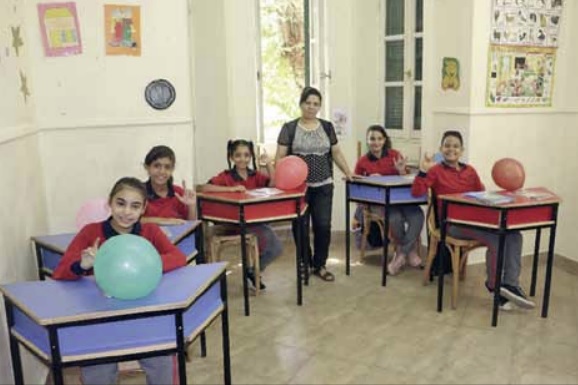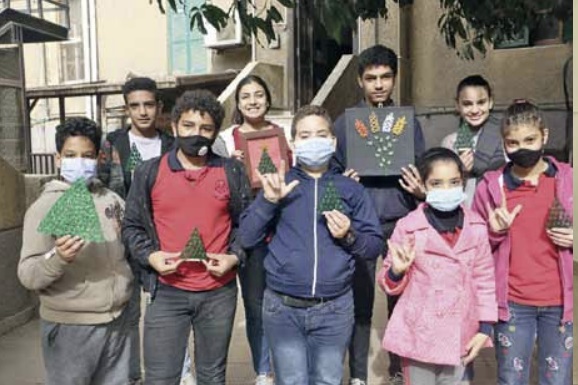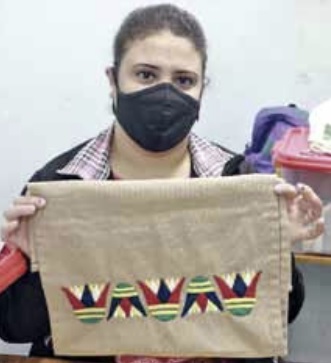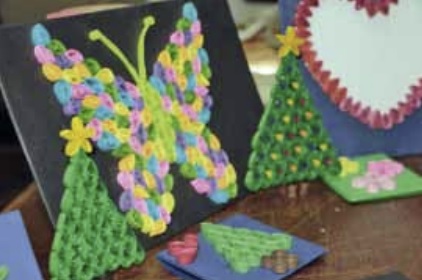History: Seeing that there was a need, the Anglican Diocese of Egypt began working with the deaf community over forty years ago. The Deaf Unit was established in 1982. It is located in Old Cairo (Cairo Governorate) and serves children and youth from all over Egypt, including ages from five to fifty. The Deaf Unit has four main ministries: (i) School (ii) Vocational training (iii) Audiology clinic, and (iv) Training programme.
Our target populations are deaf and hearing-impaired children and adults who cannot find or afford services in Egypt. We aim to provide them with new opportunities both economic and social. Often, the deaf children who come to the Unit are from families where both parents and perhaps all other siblings have problems with hearing. This situation often leads to many misunderstandings in the family. The Deaf Unit offers kindergarten, primary and middle school for all the deaf and hearing-impaired children. In addition, we provide workshops, trainings and audiology clinic. At the Deaf Unit we aim to provide as much opportunity for better communication as possible. In order to do this, we provide free sign language classes every day to the parents and people within the local community, and help to educate them on the ill-founded stereotypes of the deaf, and give them the opportunity to build connections with other families that have deaf children.
Vision: To build the capacity of deaf and hearing impaired children and youth, and to provide them with educational, economic and social skills to effectively integrate them into various aspects of life.
Mission: To provide professional educational, extracurricular, and character-development programs and services for deaf and hearing-impaired children and youth, to enable them to join the labour market economically as well as socially through professional trainings and programs.
During this difficult time recently, the Deaf Unit joined in a very useful programme, which helped us to support forty families who are spending more time at home, maybe struggling with reduced income and are unable to access all the information on what COVID-19 is and how to prevent it spreading. The program supported families to build stronger relationships, encourage positive parenting, and reduce the risk of violence against children at home.
Many parents and students were encouraged to join us in this very useful program. They shared many positive comments about the program which give us the energy to continue our service. The Deaf Unit thought about the way to communicate with the children and parents while they were at home. The teachers created a WhatsApp group and recorded many awareness and educational videos for them. It is very helpful to keep in touch with all our lovely children and parents. They have given us very positive comments about the videos. We would like to thank our teachers for the way they have inspired and supported the parents and children with many creative ideas.
Recording the grade one curriculum: We remain keen to add additional facilities to the Deaf Unit to enhance the educational experience for our students. This year the Unit has a big project which is documenting the curriculum of grade 1 to signlanguage videos. We had already started at the beginning of 2020 but unfortunately, everything had to stop after COVID-19. But we had hoped that this project would be completed this year – and indeed amidst many preventive measures but with God’s support last month we had finished filming Al-Arabic curriculum of first grade. The project has many benefits. It allows deaf students the opportunity to watch lessons more than once while at home which will improve their ability to remember the lessons when the teachers leave the school.
Workshops – Several workshops have developed recently at the Deaf Unit. Here are some of them:
Seashell – One of the wonderful workshops at the Deaf Unit is seashell works. The Deaf Unit is seeking to teach deaf children and adults new skills to support them in their independence. The students are learning how to decorate wood with seashells in the shape of jewelry boxes and crosses.
Origami – The Deaf Unit provides Origami workshops for deaf children during the school days. We adore origami for kids. We love the magic of turning a piece of paper into something useful, or a toy, or a pretty decoration. Origami is not only for fun, but there are also huge educational and social benefits. Some of the benefits are: working together, taking pride in your work, eye-hand coordination, and memory, patience, and attention skills. The children are very excited to make Christmas origami such as trees.
Making accessories – Giving the deaf children the choice to make their own accessories is very important to them. This workshop supports the development of cognitive skills through making patterns from beads and choosing colors for a bracelet. The children are always waiting for this workshop.
Clay making – We started a clay making workshop with the deaf children to help develop their skills. The clay class is ceramic technique developed in Japan and is primarily a low firing process for clay. This process can change raw clay into durable forms with wonderful decorative effects. This workshop gives young children an excellent opportunity to develop their fine motor skills and improve their manual dexterity. Improving these skills is an excellent way of building independence and confidence. Carpentry – One of the first workshops conducted at the Deaf Unit was carpentry and it has been at the heart of our school ever since. In the Deaf Unit’s carpentry classes, students develop a variety of woodworking skills as well as ways to use different tools. However, some of the most substantial learning that occurs in the workshop is related to the development of character. The desire to make things is so foundational in children that they are willing to do challenging work in order to create something beautiful.
Khalamia Workshop – One of the most important workshops that we thank God for this year is Khalamia. This helps deaf women to learn a profession and earn money through selling their products at fairs. The deaf women produce many beautiful products such as pillowcases and dining room table runners.
Empowering workshops for mothers – One of our missions this year is to empower parents, especially mothers. In Egyptian society, while it is accepted and oftentimes encouraged for the woman to work outside the home and build her skills as a professional, her main role is traditionally seen as being a mother. Therefore, we support the participation of women in public life and their right to employment and their own income through providing a sewing workshop for free, to teach the mothers sewing skills.
Food parcels – The Deaf Unit is preparing food parcels for the parents to help them cook healthy meals for their children at home. The food parcels include: meat, cheese, milk, pasta, rice, chicken, oil, tinned vegetables, butter and beans.
Need – The Deaf Unit offers services for low-to-no tuition. We charge parents a tiny amount of money, some parents don’t pay anything. The Deaf Unit has a serious financial problem and we need to find a sponsor for every student to cover their costs.
If you would like to support a student or help us in any way, or would like further information please contact us via email [email protected] Praise & Prayer – We are grateful to God for protecting us from Covid-19. Please pray for the staff to be safe, healthy, patient and passionate. And please pray for all of us here at the Deaf Unit in Old Cairo as we continue our service to deaf children and parents. Photos: Deaf Unit Cairo






